Recently I wrote about the gender imbalance in the tech industry, and made some practical suggestions as to what we can all do to change that. One of the areas I covered was recruitment: if you're an employer, it's important to review your recruitment and employment practices to ensure you're not just attracting the same kind of people all the time.
Many tech employers, from giants to startups, are determined to make their companies more reflective of their customer and user base, and are changing the way they attract applicants and the recruitment processes those applicants have to go through.
This isn't about positive action: I'm not talking about introducing quotas or lowering standards in order to become more diverse. Instead, it's about recognising that by even indirectly discouraging underrepresented sections of the community from working for them, employers are missing out on a huge talent pool.
More companies are complaining of a skills shortage as the demand for talented workers in the tech industry continues growing. These firms know they have access to a bigger talent pool if they ensure their recruitment practices aren't biased in any way.
Companies also know that there are business benefits by being more diverse: if your employees are customer facing, it helps if they're as representative of the customers as possible. A McKinsey study found that more diverse companies tend to be higher performing. Apple products, for example, aren't used exclusively by young white men: but most Apple store staff are young white men, and Apple wants to change that because they know it helps them to attract a broader customer base.
In this article I'll outline some of the steps employers are taking to increase the diversity of their employees, and I won't limit this analysis to gender diversity: a commitment to diversity is about something much broader than that, and isn't just about putting people into groups either. It can also be about recruiting people with a different mindset from existing employees, people who don't fit the company mould: something which many employers know can help them be more innovative and keep up with change.
I'm going to look at:
- Job titles: how employers are recognising that the name you give a job can affect who applies for it.
- Adverts: taking care in how they're worded.
- The recruitment process: making it as accessible as possible and ensuring it uses objective measures.
- Company culture: reducing the emphasis on cultural fit when recruiting and ensuring your culture doesn't exclude people.
- Location and hours: adopting more flexible practices to attract people with disabilities, caring commitments or who don't work in a location with lots of tech firms.
- Public perception: recognising that advertising, marketing and stores will influence people's perception of a company as a place to work.
- Outreach: how employers are reaching out to communities and encouraging young people to consider them as a future employer.
Ensuring Job Titles Apply to Everyone
For most people working in tech, their job title is something they don't give much thought to: some companies use very generic ones, others (especially the public sector in the UK) use odd ones that mean very little, and yet other employers, especially startups, do without them altogether.
But when you're placing a recruitment advert, a job titles will give potential applicants a quick idea of what the job involves and whether they'd be qualified to apply. Many people read no further than the job title.
Buffer discovered that by including the word 'hacker' in many of their job titles, they were putting women off applying for those jobs: only 2% of applicants were women. So they started an internal dialogue of how they might change their job titles. As they explain on their blog:
Through lots of discussion, we generally agreed that engineer sounded neutral, and developer sounded the friendliest, clearest and most inclusive of all.
So the word 'hacker' was replaced by the word 'developer' in their job titles. While their development team remains their least diverse team according to their diversity dashboard, it does now include 10% women, which is significant progress from 2% of applicants.
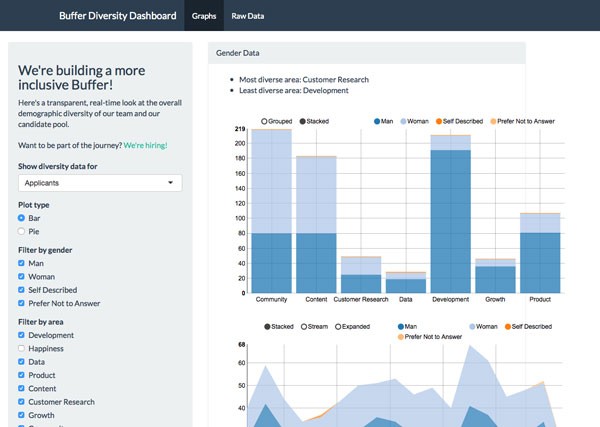
Job Adverts
There's evidence that most tech job recruitment ads tend to include language that people perceive as masculine. This results in a subliminal message that can discourage women from applying. However the same research shows that if you use more inclusive, feminine language, it doesn't put men off applying: they'll still apply in the same numbers. What will happen is that more women will apply: some simple math tells you that this gives you more candidates and a broader recruitment pool, which can be no bad thing.
Unitive is a startup founded to help tech firms adopt recruitment practices to enhance their diversity, including reviewing the language used in job adverts. It focuses on removing unconscious bias in all aspects of the recruitment process, including the words used in adverts. In an interview with CCN its founder Laura Mather said that many job adverts "project a 'brogrammer' culture".
Their software identifies words with male bias in job adverts so that recruiters can change the language to be more inclusive. So an advert requiring a 'driven, go-getting' individual, for example, could be edited to use words like 'excellent' and 'dedicated'.
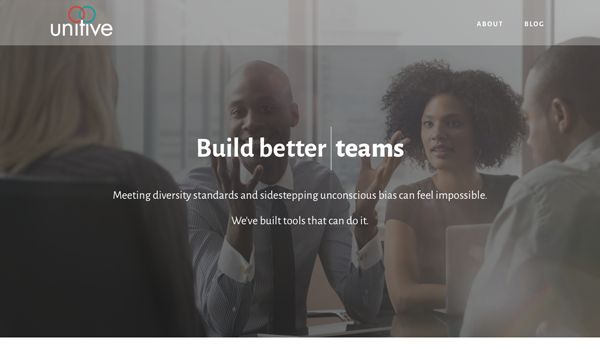
Again this doesn't mean lowering standards or not seeking applicants with the skills you need: it just means using words that still describe what's required but in a way which won't exclude women.
The Recruitment Process
If you're applying for a job in a tech firm, you'll find that there's quite a range of recruitment procedures. This ranges from the traditional face-to-face interview to remote project-based assessment and everything in between.
Tech firms, especially startups, tend to be more innovative than other industries when it comes to recruitment practices. It's more common for recruitment to be conducted entirely remotely, as so many firms have dispersed teams. For example at Automattic the recruitment process is all done remotely using text: you won't be expected to have a Skype call at 3 AM with someone the other side of the world. That's not a bad thing, as I don't imagine any of us would perform at our best in those circumstances! Buffer employ a recruitment process that includes a 'boot camp': a trial period where you work on a specific project. Both firms base hiring decisions on seeing your work instead of the more traditional method of asking you to sell yourself to them.
British hosting company Bytemark Hosting has adopted an even more radical approach: it makes its recruitment anonymous to reduce bias. On their website they say:
Have you ever thought your chances of being hired were affected by something ... other than your ability to do the job? Hiring biases are real and they are ugly. We don't even trust ourselves to avoid them.
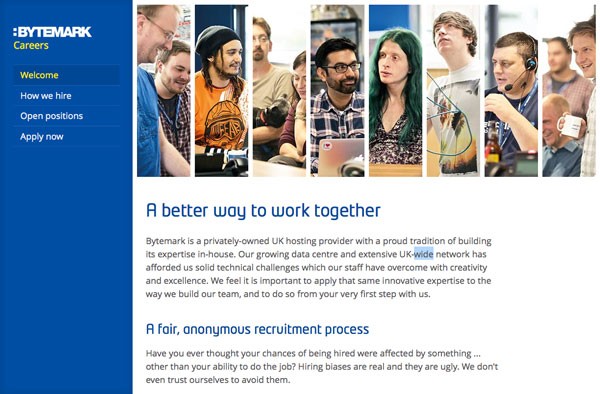
This level of honesty led them to change their recruitment process in early 2015, replacing phone calls or face to face chats in the early stages of their recruitment process with anonymous text-based interviews using online chat. If you pass this stage you'll complete an online challenge designed to let you showcase your skills: again this removes bias. It's only at the final stage of interviews that you'll actually meet someone from Bytemark.
I spent 15 years working in Human Resources and this runs counter to the perception of so many hiring managers that they just 'know' when they've met the right candidate. An attitude like this leads to companies recruiting in their own image: hiring managers will recruit people they 'click' with, who it's not unreasonable to assume will probably be like them in terms of gender, race, sexuality and disability status, not to mention personality. In my experiences hiring managers relying on intuitive decisions like this made a lot of mistakes they later come to regret!
Company Culture
It's common for tech firms to require new employees to fit in with the existing culture: Google even goes so far as to state that one of the traits it looks for is 'Googleyness'.
But there's evidence that companies who repeatedly recruit people in the same mould struggle to become more diverse and might even suffer in other ways, as they fail to attract people with new ideas and ways of thinking.
In an article in Forbes, Micha Solomon outlines the disadvantages of recruiting to a 'mould':
Whatever particular culture fit strategy you pursue, to succeed you need to make room for diverse backgrounds, interests, work and learning styles, and need for work/life balance rather than endless happy hours with the boss and the “team.”
For many hiring managers, identifying people who fit with the firm's culture actually becomes identifying people who they get along with during the interview.
Being successful in a firm and in a job doesn't mean being best friends with the boss or even your colleagues. And companies who consistently hire people 'like them' risk getting sucked into a comfort zone that can impact on their ability to react to change, and can become less diverse.
So companies like Bytemark who are working to become more diverse have dropped any requirement for a cultural fit. On the Bytemark careers site, they say:
There's no "cultural fit" requirement. If you have a skill we like and you can learn and work with a team, you'll get on fine here. You'll be our company culture, and we welcome your contribution.
However this is unusual. I struggled to find examples of firms that don't include cultural fit anywhere in their recruitment process, which is why it's so important that those companies ensure their culture is one that's diverse and open to new ideas and people.
So what are tech firms doing to ensure that their company culture doesn't exclude people?
Microsoft are working to ensure that their company culture embraces diversity:
Microsoft recognizes that diversity gains will not be sustained unless the work environment promotes behaviors that encourage new ways of problem-solving and rewards diversity of thought. We foster a culture of inclusive behaviors.
They've adopted measures such as providing training in diversity and culture to leaders and other staff, setting up programmes specifically aimed at encouraging women and ethnic monitories to advance within the firm, and offering flexible work arrangements. They also publish their diversity figures.
The attitudes and openness of high-profile senior staff will have an impact too. The fact that Tim Cook came out as gay in 2014 is likely to have an impact on how accepted gay people feel in the firm. And Sheryl Sandberg's vocal advocacy of women's empowerment should have an impact on how it feels to be a woman at Facebook.
Flexible Working Practices
Much of the debate around flexible working has traditionally focused on the fit between work and caring responsibilities, both for parents and for those with elderly or unwell relatives. But it goes much further than that. Tech firms, whether established giants or growing startups, are more likely than companies in other industries to have distributed teams and this can have a positive impact on diversity.
Not recruiting from a company's local area can positively impact racial diversity, for example. And allowing (or better, encouraging) staff to work from a location of their choice and adopt flexible hours can help employees with disabilities or mental illness.
Automattic employee Tom Nowell has written candidly about how his employer keeps its workers happy and healthy through being responsive to their needs and not having fixed demands in respect of working hours and location, for example. Automattic runs an internal Slack channel called Bluehackers which lets 'Automatticians' who are struggling support each other, and it focuses on people's health and long-term development rather than how many hours they're working. As Tom says:
I was told they didn’t care how much work I was doing as long as I was learning and happy.
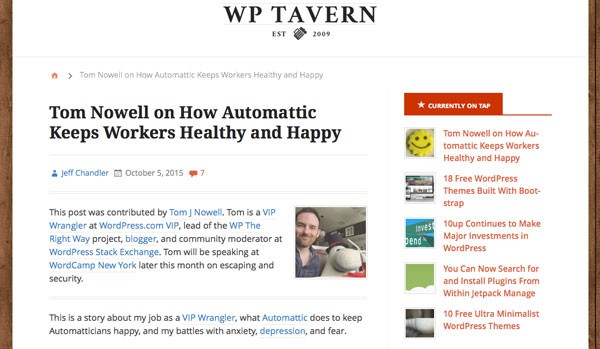
Obviously no employer will grow if employees are unable to do much work for prolonged periods, but Automattic knows that by being flexible and providing support, it will retain and attract talented employees like Tom.
The tech industry has more than its fair share of distributed teams: firms like Automattic and Buffer wok with entirely distributed teams and find that this gives them access to a larger talent pool, as well as reducing office costs.
A hosting company that works in a distributed way is Site5: all of its employees work from home and they're based all over the world. As a customer of Site5 I can attest to a major advantage of this: it means that whatever the time of day, there's always someone available. It also means that those people don't have to work antisocial shifts. I've had experiences of working on something with them over many hours and have watched as the location of support staff I'm dealing with moves across the globe with the daylight! It also means that they have a team which is extremely racially diverse, with staff based on every continent except Antarctica.
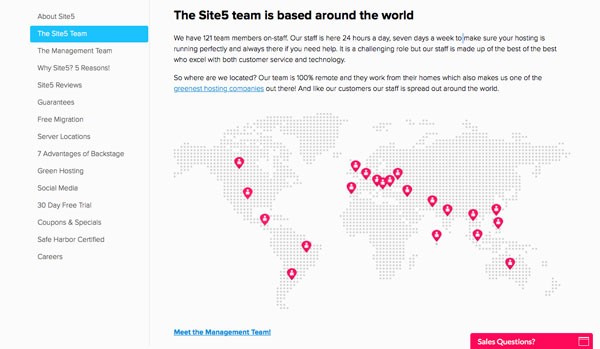
On their careers site, they state:
We want each of our team members to have a healthy balance between work and life...we understand that our team member’s time, their families, and their life outside of work are important.
Public Perception
Before any job applicant sends in their CV, the chances are they've come across the company in some other way. They might be a customer or work for a client or supplier organization (or a competitor). Or they may just have seen the company's advertising material or read its website.
So the way that companies present themselves to the world will have an impact on the people who consider applying for jobs with them, and how diverse that group will be. Companies that look diverse and project a progressive, inclusive image will be more likely to attract a diverse range of job applicants.
Apple knows that anyone applying for a job will already be a customer, and will most likely have visited an apple store (some people spend their lives in them!). Tim Cook says he's committed to “being as innovative in advancing diversity as we are in developing products” and part of that commitment is in making its store staff more diverse:
"We want every person who joins our team, every customer visiting our stores or calling for support to feel welcome."
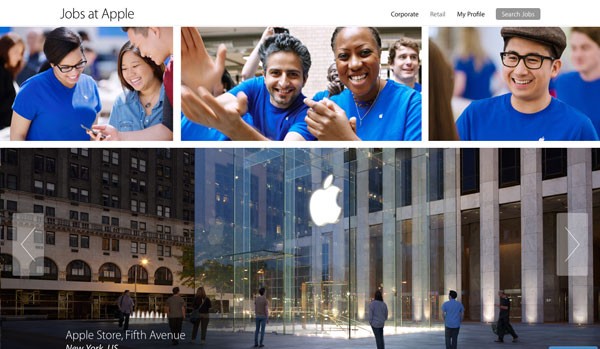
Apple uses inclusive language on its careers page, highlights its diversity and affirmative action policies and includes images of a diverse range of apple store employees. It makes its commitment to diversity very public. Its diversity figures show that it's doubled the rate of female hires in the last year, but it explicitly recognises that this isn't enough and is continuing to sponsor programmes designed to encourage underrepresented groups to seek careers in tech and with Apple.
Outreach
Outreach is an important way for companies to ensure that people are aware of the company and what it does, both in terms of marketing and recruitment. This is one area in which companies are specifically engaging in outreach with individuals and organizations from underrepresented groups.
The BBC, for example, has outreach programmes around the UK and attends careers fairs and other events with a focus on reaching minority communities which may not traditionally have identified with the broadcaster.
IBM engages in outreach with women's tech groups such as GirlGeeks, sponsoring events and sending female employees along to speak to other women who might be among a future applicant pool. IBM is also registered with Pride in Diversity, which is an Australian not-for-profit employer support program that encourages all aspects of LGBTI workplace inclusion.
Apple has programs like the Thurgood Marshall College Fund which support students in historically black colleges, and works with the National Center for Women & Information Technology to encourage more women to pursue tech careers.
Summary
Tech firms know that our industry could be more diverse, and that by attracting a more diverse pool of job applicants, they have access to more talent and fresh ideas. And many of them are doing something about it. While there's still plenty more to be done, it's encouraging to see so many tech firms large and small tackling this issue head on and reviewing the way they attract, recruit and treat employees.
Support Spirit Day
Show your support, as Millions go purple on Spirit Day in a stand against bullying and to show their support for lesbian, gay, bisexual and transgender (LGBT) youth.
Resources
Graphic Credit: Globe icon designed by Chris Tucker from the Noun Project.


Comments